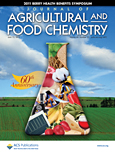
JOURNAL OF AGRICULTURAL AND FOOD CHEMISTRY
Scope & Guideline
Elevating Agricultural Sciences with Cutting-Edge Research
Introduction
Aims and Scopes
- Food Chemistry and Biochemistry:
The journal emphasizes studies that explore the chemical composition, structural characteristics, and biochemical properties of food substances, including the effects of processing, storage, and preparation on food quality and safety. - Pesticide and Herbicide Development:
Research on the design, synthesis, and evaluation of new agrochemicals, including pesticides and herbicides, is a core focus, addressing the need for environmentally sustainable solutions in agriculture. - Natural Products and Bioactive Compounds:
The journal highlights the discovery and characterization of bioactive compounds from natural sources, including plants and fungi, and their potential health benefits and applications in food and agriculture. - Food Safety and Toxicology:
Studies regarding the detection and mitigation of foodborne toxins and contaminants, including mycotoxins and pesticide residues, form a critical part of the journal's scope. - Microbial and Fermentation Technology:
Research on the use of microorganisms in food production and preservation, including fermentation processes and the development of probiotic foods, is a significant area of interest. - Nutritional Chemistry:
The journal addresses the nutritional aspects of food chemistry, exploring how various compounds affect health and metabolism, including the role of dietary components in chronic diseases. - Sustainability in Food Systems:
Publications that investigate sustainable agricultural practices, the impact of climate change on food production, and innovative approaches for enhancing crop yield and resilience are increasingly featured.
Trending and Emerging
- Plant-Based and Alternative Proteins:
Research on plant-based proteins, including their extraction, functionality, and health benefits, is rapidly expanding, driven by the increasing consumer demand for sustainable and health-conscious food options. - Food Safety and Analytical Techniques:
There is a growing emphasis on the development and application of advanced analytical techniques for detecting contaminants and ensuring food safety, reflecting heightened consumer awareness and regulatory scrutiny. - Gut Microbiota and Health:
Studies focusing on the relationship between diet, gut microbiota, and overall health are emerging prominently, particularly in the context of chronic diseases and dietary interventions. - Sustainable Practices in Agriculture:
Research addressing sustainable agricultural practices, including the use of biopesticides, organic farming methods, and the role of agroecology, is becoming increasingly relevant in the journal. - Metabolomics and Functional Foods:
The application of metabolomics to understand food composition and its effects on health is on the rise, highlighting the potential of functional foods in disease prevention. - Food Waste and Valorization:
Research aimed at reducing food waste and exploring methods for valorizing food byproducts is gaining attention, aligning with global sustainability goals. - Bioactive Compounds and Nutraceuticals:
The exploration of bioactive compounds and their health benefits, particularly those derived from natural sources, is a burgeoning area of interest, reflecting the demand for functional foods.
Declining or Waning
- Traditional Agricultural Practices:
Research focusing solely on conventional farming methods without integrating modern technologies or sustainability aspects has seen a decrease, as the field moves towards more innovative and eco-friendly practices. - Basic Chemical Studies Without Application:
There is a noticeable decline in purely theoretical or basic chemical research that does not translate into practical applications or implications for food chemistry and agriculture. - Single-Ingredient Food Studies:
Research centered on the analysis of single food ingredients in isolation has diminished, as there is a growing preference for studies that assess interactions within complex food systems or dietary patterns. - Limited Scope on Animal Products:
Topics solely related to traditional animal products, such as milk or meat, without a focus on health implications or sustainability, are receiving less attention compared to plant-based alternatives and their nutritional benefits.
Similar Journals

Journal of Agriculture and Food Research
Innovating Agriculture through Open Access KnowledgeJournal of Agriculture and Food Research, published by ELSEVIER, is a premier Open Access journal that has made significant strides in the fields of agricultural and biological sciences since its launch in 2019. With an ISSN of 2666-1543, the journal is headquartered at Radarweg 29, 1043 NX Amsterdam, Netherlands. It holds a remarkable position in the 2023 Category Quartiles, achieving Q1 rankings in Agricultural and Biological Sciences (miscellaneous), Agronomy and Crop Science, and Food Science. The journal's impactful research is reflected in its impressive Scopus ranks, including a ranking of #25 in Agricultural and Biological Sciences, showcasing the journal's commitment to high-quality, innovative research relevant to contemporary agricultural challenges. Researchers, professionals, and students can benefit from its diverse array of published works, fostering a greater understanding of food security, sustainable agriculture, and innovative food technologies. By embracing an open access model, the journal ensures that critical research is readily available to a global audience, aiming to enhance knowledge dissemination in this vital field.

AGRONOMIA MESOAMERICANA
Exploring innovative solutions in agronomy and food science.AGRONOMIA MESOAMERICANA is a distinguished open-access journal published by UNIV COSTA RICA, dedicated to advancing knowledge in the fields of agronomy, crop science, food science, and soil science. Since its inception in 1990, the journal has provided a platform for researchers and professionals to disseminate their findings, contributing significantly to the agricultural sciences. With an E-ISSN of 2215-3608, it operates from Costa Rica, specifically from the Centro Investigaciones Agronómicas, situated in San José. Despite its current classification in the Q4 quartile for 2023 in the respective fields, it aims to stimulate academic discourse and inspire innovative solutions to pressing agricultural challenges. The journal attracts a diverse audience and encourages submissions that focus on sustainable practices, food security, and environmental stewardship, making it an essential resource for researchers, professionals, and students alike seeking to enrich their understanding and share crucial insights in the agronomy landscape. Open access ensures that all published research is freely available, fostering collaboration and knowledge exchange worldwide.

ACS Agricultural Science & Technology
Empowering the Next Generation of Agricultural ScienceACS Agricultural Science & Technology, published by the American Chemical Society, is an influential journal dedicated to the advancement of agricultural research and technologies. Since its convergence in 2021 and continuous publication until 2024, the journal has established itself in the fields of Agricultural and Biological Sciences, Agronomy and Crop Science, Food Science, and Plant Science, having achieved a commendable Q2 ranking across these categories in 2023. This signifies its growing impact and relevance within the global research community, evidenced by its Scopus rankings, which place it in the top percentiles of its fields. Although currently not an open-access journal, it provides a critical platform for disseminating pioneering research that addresses pressing agricultural challenges, fostering innovation in crop production, food security, and sustainable practices. As such, it serves as an essential resource for researchers, professionals, and students aiming to contribute to the future of agricultural science.
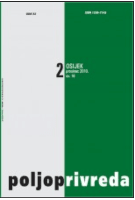
Poljoprivreda
Connecting researchers to revolutionize farming practices.Poljoprivreda is a distinguished open-access journal dedicated to the field of agronomy and crop science, published by the FAC Agriculture Osijek in Croatia. Since its inception in 2000, the journal has been committed to disseminating high-quality research that informs both academic and practical advancements in agriculture. With an ISSN of 1330-7142 and an E-ISSN of 1848-8080, Poljoprivreda provides a vital platform for researchers, professionals, and students to engage with the latest findings and methodologies in agronomy, contributing significantly to the enhancement of agricultural practices in Croatia and beyond. Although currently ranked in the 22nd percentile within its category according to Scopus, the journal aspires to elevate its standing by welcoming innovative research that addresses contemporary challenges within the agricultural sciences. By fostering open access since 2000, Poljoprivreda ensures that its scholarly content is freely available, promoting wider dissemination and collaborative opportunities among researchers globally.
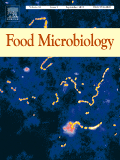
FOOD MICROBIOLOGY
Fostering knowledge that nourishes the food industry.FOOD MICROBIOLOGY is a premier journal, published by Academic Press Ltd - Elsevier Science Ltd, dedicated to advancing the field of food science and microbiology. With an impressive impact factor and recognition as a Q1 journal in Food Science and a Q2 journal in Microbiology, it holds a significant position in the scientific community, emphasizing research that explores microbial phenomena in food products. Established in 1984, the journal continues to thrive with converged coverage until 2025, making it an essential resource for researchers, professionals, and students aiming to deepen their understanding of food-related microbiological issues. While it operates under traditional access options, the journal is highly regarded for its rigorous peer-review process and impactful contributions to agricultural and biological sciences, ranking #26 in Food Science and #22 in Microbiology according to Scopus. Researchers are encouraged to submit their findings that impact food safety, quality, and preservation, fostering a collaborative environment that generates knowledge pivotal for the food industry and public health.
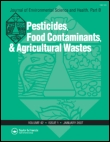
JOURNAL OF ENVIRONMENTAL SCIENCE AND HEALTH PART B-PESTICIDES FOOD CONTAMINANTS AND AGRICULTURAL WASTES
Elevating research on pesticides and their impact on food safety.JOURNAL OF ENVIRONMENTAL SCIENCE AND HEALTH PART B-PESTICIDES FOOD CONTAMINANTS AND AGRICULTURAL WASTES, published by Taylor & Francis Inc, stands as a crucial platform for advancing knowledge in the intersection of environmental science, food safety, and agricultural practices. With an ISSN of 0360-1234 and E-ISSN 1532-4109, this journal has been disseminating significant research since 1976 and continues its invaluable contributions through 2024. Recognized in notable quartiles such as Q2 in Food Science and Q3 in both Medicine and Pollution, it reflects a robust academic stature, ranking in the top half of Scopus categories, specifically in Agricultural and Biological Sciences at rank #158/389 and Environmental Science at rank #82/167. This makes it an essential resource for researchers, professionals, and students who are focused on understanding and mitigating the impacts of pesticides, food contaminants, and agricultural waste. Although it is not an open access journal, the depth and quality of its published work offer a wealth of information for those striving to innovate in sustainable practices and public health safety. Engage with the latest findings and discussions that shape the future of environmental health and food science.

PAKISTAN JOURNAL OF AGRICULTURAL SCIENCES
Pioneering Research in Crop and Soil SciencesWelcome to the Pakistan Journal of Agricultural Sciences, a prominent platform for disseminating vital research findings in the fields of agronomy, crop science, food science, plant science, and soil science. Published by the prestigious University of Agriculture in Faisalabad, this journal aims to enhance the scientific discourse surrounding agricultural innovation and sustainability in Pakistan and beyond. With an ISSN of 0552-9034 and E-ISSN of 2076-0906, the journal serves as a valuable resource for researchers, professionals, and students interested in cutting-edge agricultural developments. As of 2023, the journal is ranked in the Q3 category for Agronomy and Crop Science as well as Food Science and positioned in Q4 for Plant and Soil Science, highlighting its growing impact within a competitive academic landscape. While the Pakistan Journal of Agricultural Sciences is not currently open access, it provides a comprehensive archive of research converging from 2011 to 2024, ensuring that critical knowledge remains accessible to those striving to advance the agricultural sciences. Join us in our mission to foster innovation and support sustainable practices in agriculture.
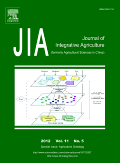
Journal of Integrative Agriculture
Championing Integrative Strategies for Ecological ProgressJournal of Integrative Agriculture, published by Elsevier Science Ltd, stands as a leading platform for innovative research at the intersection of agricultural sciences. With a significant focus on integrative approaches, this journal has established itself within the academic community, reflecting its excellence through impressive Impact Factor rankings and a consistent Q1 category status in multiple fields, including Agronomy, Animal Science, and Ecology. The journal spans a wide range of topics, making it a critical resource for exploring advancements in Biochemistry, Food Science, and Plant Science. With its diverse Scopus rankings—from Rank #3 in Food Animals to Rank #14 in Animal Science—it serves as a vital repository for cutting-edge research that influences both scientific inquiry and practical applications in the agricultural domain. Operating from China and accessible through open access options, the Journal of Integrative Agriculture aims to foster collaborative research and knowledge exchange among scientists, professionals, and students worldwide, supporting the growth and sustainability of agricultural practices.

Agricultural and Food Economics
Bridging the gap between agriculture, food systems, and economic policy.Agricultural and Food Economics is a leading journal published by SPRINGERNATURE, dedicated to the advancement of research in the interconnected fields of agriculture, food systems, and economic analysis. Established in 2013 and operating under an Open Access model, this journal serves as a vital platform for scholars and practitioners to disseminate innovative findings and insights that influence policy and practice. With a notable impact reflected in its 2023 quartile rankings—Q1 in Agricultural and Biological Sciences (miscellaneous), Q2 in Economics and Econometrics, and Q1 in Food Science—this journal is recognized for its rigorous scholarly output. It ranks among the top resources in its domain, with Scopus ranks placing it in the 88th percentile for Agricultural and Biological Sciences and the 79th percentile for Economics. The journal covers a broad spectrum of topics, including sustainable agricultural practices, the dynamics of food markets, and the economic implications of food policies. Researchers, professionals, and students alike will find valuable insights and comprehensive analyses that contribute to the ever-evolving discourse on food and agriculture.
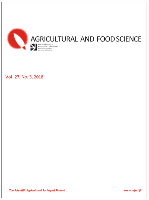
AGRICULTURAL AND FOOD SCIENCE
Connecting global researchers to revolutionize food systems.AGRICULTURAL AND FOOD SCIENCE is a prestigious journal published by the SCIENTIFIC AGRICULTURAL SOCIETY OF FINLAND, dedicated to advancing knowledge in the fields of agricultural and food sciences. With an ISSN of 1459-6067 and E-ISSN of 1795-1895, this open-access journal has been providing valuable insights and research findings since its inception in 2002. As of 2023, it holds a Q3 ranking in Food Science and is positioned at the 46th percentile within its Scopus category, ranking 210 out of 389 journals in Agricultural and Biological Sciences – Food Science. The journal features contributions from a global network of researchers, covering various topics including sustainable agricultural practices, food safety, and innovative food technologies. Based in Finland, the journal serves as an essential platform for scholars, professionals, and students who are committed to enhancing food security and agricultural productivity through rigorous scientific research. The convergence of interdisciplinary studies from 2004 to 2024 marks a critical evolution in the scope of agricultural and food research, making this journal a vital resource for anyone involved in these dynamic fields.